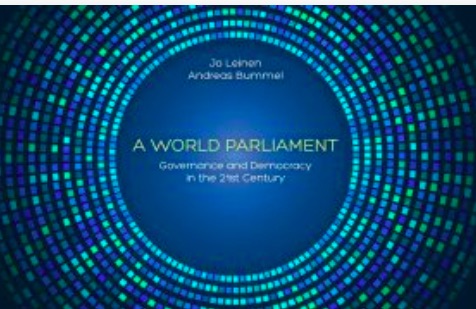EDUCATION FOR PEACE .
By Richard Falk, reprinted by Transcend.org
This is a brief promotional comment to call attention to the publication of a truly outstanding contribution to creative and restorative world order thinking. The book is entitled A World Parliament: Governance and Democracy in the 21stCenturyby Jo Leinen and Andreas Bummel, translated from German by Ray Cunningham, and published in 2018 in Berlin under the imprint of Democracy Without Borders. The book is currently available for purchase from Amazon.

I hope at a later time to do a serious review of this urgent plea for what might be called ‘cosmopolitan rationalism,’ the undergirding of a populist movement dedicated to overcoming the menace of the war system and predatory capitalism, placing a great emphasis on the potential of institutional innovation beyond the level of the state, above all, through the establishment of a world parliament with legislative authority. This would be a revolutionary step in the governance of humanity, and if it happens, is likely to be preceded in the evolutionary agenda of the authors by a global assembly endowed with recommendatory powers but lacking a mandate to make and implement binding decisions, and hence incapable of resolving conflicts or solving challenges of global scope.
The authors are both dedicated advocates of the institutionalization of governmental authority of regional and global scope. Leinen has been a leading member of the European Parliament since 1999 as well as a German government official. Bummel is an internationally known and respected champion of world federalism incorporating democratic values. He is co-founder and director of the NGO, Democracy Without Borders.
(Continued in right column)
What are the most important books about the culture of peace?
(Continued from left column)
What makes this book a great gift to humanity at a time of global emergency, is what I would call its ‘informed global humanism’ that sheds light on the long and distinguished history of proposals for global parliamentary authority. The institutional focus is greatly expanded and deepened by an erudite consideration of why global problems, as varied as food, water, environment, climate change, and economic justice cannot be solved without the presence and help of a world parliament capable of generating enforceable law. The authors bring to bear an astonishing range of knowledge to support their conclusions, drawing on the accumulated wisdom of philosophers, scientists, social scientists, moral authority figures, and statesmen to illuminate the question of how to meet the formidable challenges of the age. This enlargement of concerns lends weight to their commitment to clear the path of obstacles currently blocking the formation of a world parliament.
Indeed, while building their central case for a world parliament, Leinen and Bummel, have authored a book that tells you all you need to know to understand with some depth what is wrong with the world as it now functions, how it can best be fixed, and by whom. Their central political faith is rooted in an espousal of democratic values that they project as a positive global trend. Only here do I have some reservations, reflecting my reactions to the militarization of democracy in the United States and to the strong trends favoring autocracy in most leading countries. I do share with the authors a skepticism about the capacity of existing elites to promote the necessary reforms, as well as their sense that the time of a transnational revolution of the industrial proletariat has passed, with hopes now resting in the eruption of a transnational democratic and cosmopolitan democratic movement promoting progressive and humane forms of global governance.
I strongly recommend this book as a source of wisdom, thought, and the fashioning of a positive vision of the human future. Pasted below is the table of contents of A World Parliament to give a more concrete picture of the scope and grandeur of this extraordinary scholarly contribution with manifold activist implications for those of us who consider themselves citizen pilgrims.